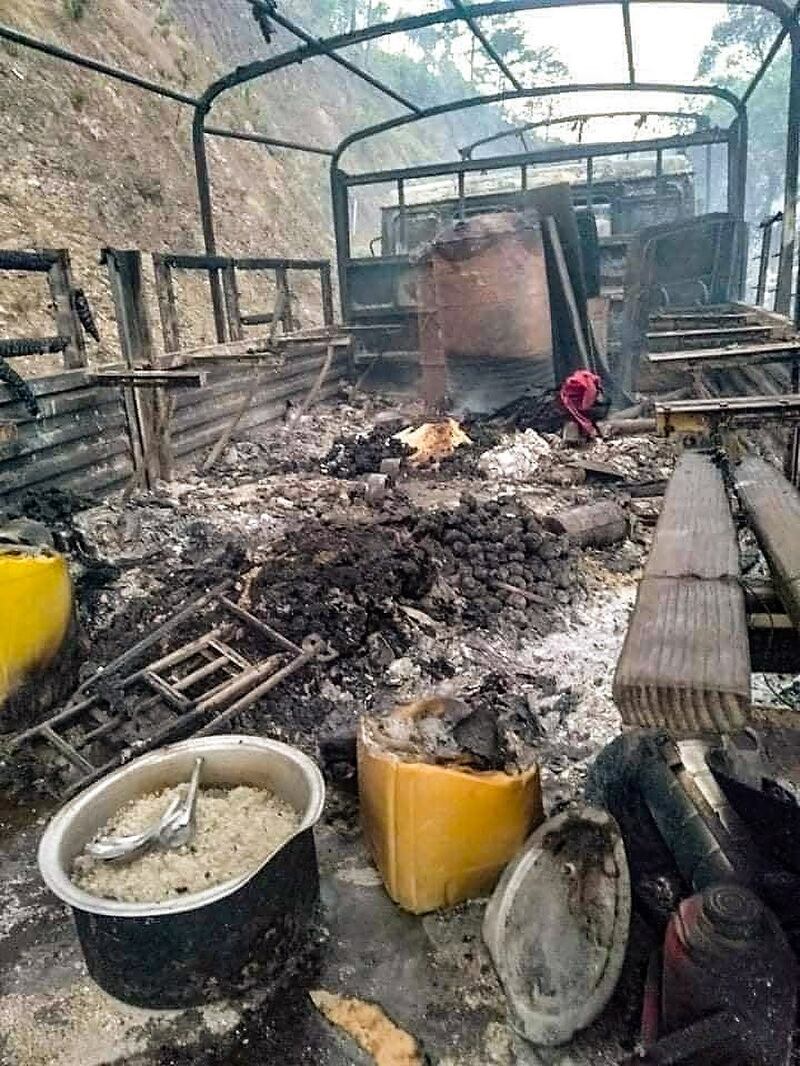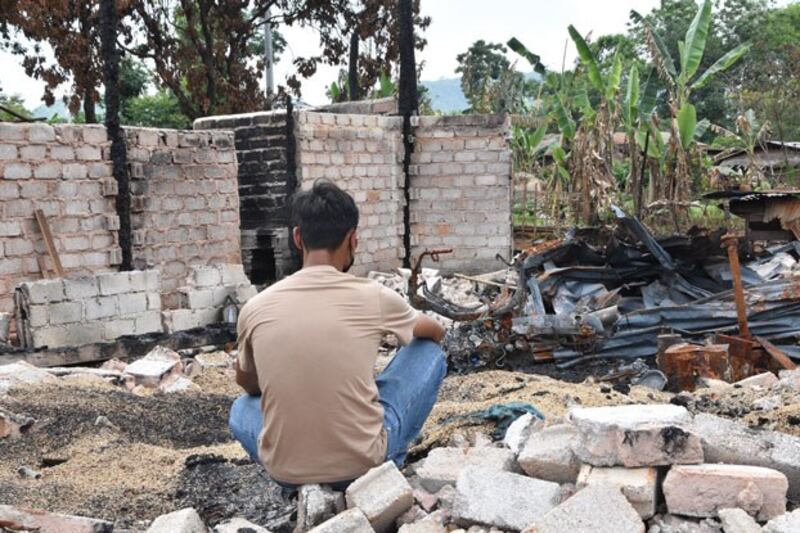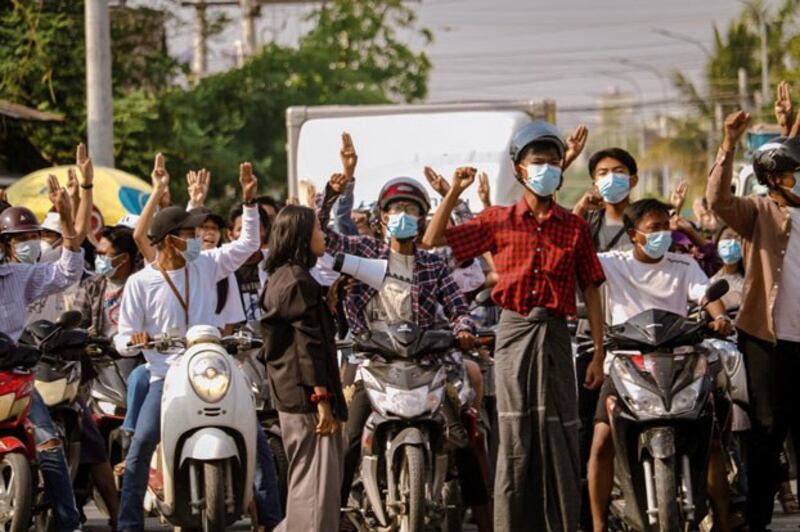Thousands of Chin civilians have fled into the jungles of western Myanmar to evade airstrikes by the junta, while a rebel army in the country’s northeast near China attacked army tankers carrying jet fuel in a bid to thwart more aerial assaults, sources in the border regions said Tuesday.
About two months after the Feb. 1 overthrow of the elected government by the military, fighting flared up along Myanmar’s borders with China and India between regime troops and junta opponents, including a veteran ethnic army in Kachin state and volunteer militias wielding home-made weapons in Chin state.
In ambush attacks Monday night and Tuesday, the Kachin Independence Army (KIA) attacked tanker trucks in northern Shan state on suspicion that they were carrying jet fuel brought in from nearby China for Myanmar’s junta, said KIA spokesman Col. Naw Bu.
“The military used this fuel to attack us in various ways. That is why the attack was carried out,” he told RFA.
“They had attacked us from the air several times in various ways. That's why we intercepted their fuel tankers,” added Naw Bu. He said the trucks went up in flames, but did not say how many were destroyed.
The Irrawaddy, an independent online news outlet, said seven trucks were attacked on the Union Highway and on Kutkai-Hseni road, transporting fuel from China through the border trading town of Muse.
The junta had turned to China for jet fuel after a Singapore-Myanmar joint venture that had supplied the army suspended shipments following the Feb. 1 coup, the Irrawaddy said.

100 clashes in Kachin
While no fighting was reported in Shan state aside from the fuel truck ambushes, to the northwest in Kachin state, which borders China, the KIA has been under heavy attack by junta fighter jets trying to retake a military camp at Alawbwan that was captured by the Kachin in April.
Earlier this month, the KIA said it had been engaged about 100 clashes with regime forces, including at least 60 airstrikes, and had killed 30 junta troops since March.
The KIA said that on Sunday it had intercepted a junta boat carrying food and fuel on the Irrawaddy River to support for the fight for the Alawbwan camp.
The junta’s occupation Saturday and continued shelling of the mountainous town of Mindat in Chin state has forced some 5,000 people to flee and live rough in nearby forests, while those that remain in town struggle without water or power and remain under army fire, local residents and a rights group told RFA.
“I had to hide in the forest for safety. There are a lot of people here. Some women are giving birth in the forest,” said a Mindat resident, who estimated that there were about 800 people clustered to the northeast of the town.
“We are running out of food in the forest. People hiding in the woods near the village find it very difficult to get back home to carry food. They will get arrested or shot as soon as the soldiers see them,” the civilian told RFA.
Troops are being deployed in several schools and strategic places in Mindat, including churches.
Mindat has a population of 10,000-15,000 people, including suburbs, and with the exception of the elderly, more than 5,000 people have fled into the mountains. Government workers are also fleeing into the jungle and there is no water supply in the town, local residents said.

Nine dead Chin youths
More than 15,000 people had crossed the porous, mountainous border to the northeastern Indian state of Mizoram, which lies opposite Chin state, and the flow "is increasing day by day," the vice chairman of Mizoram's State Planning Board, H. Rammawi, told Reuters news agency Tuesday.
Fighters of the Chinland Defense Force (CDF), had been engaged in daily battles from May 12 until May 15, when the junta occupied Mindat with 1,000 fully-armed troops who used civilians as human shields and sprayed gunfire indiscriminately.
The CFD militiamen pulled out Sunday to protect civilians in the town from further artillery attacks and fire from helicopter gunships, one Chin fighter said.
“We are not well organized like an army. People from villages just tried to stop the military in their own way to protect Mindat, so we could not get the exact number of casualties. What we can confirm now is nine deaths on our side,” he told RFA, speaking on condition of anonymity for his safety.
The dead were students between the ages of 16 and 30, all killed by artillery shells fired by the military, another CDF member said.
“None of our fallen comrades was over 25 years old. The boy who died in the first battle was only 17 years old. He was my nephew,” said the uncle of CDF member Htang Hon Htang, who was killed on May 13 clashes.
“At this age, he should be going to school. All these young people are now involved in fighting to overthrow the dictator,” the uncle added.
Win Myat Aye, the minister for humanitarian affairs and disaster management of the National Unity Government, a month-old shadow cabinet, wrote on Facebook on Tuesday that thousands of people remain trapped in Mindat, where water, electricity and many phone lines have been cut off.
"They are firing heavy weapons at civilians. In such a situation, people dare not leave their houses at all. They go from house to house, destroying things and looting property,” said Za Op Ling, deputy executive director of the Chin Human Rights Organization (CHRO).
“We see this as violations of international human rights laws as well as international humanitarian laws," he added.

'T hey underestimated the people'
In the Chin state capital Hakha, about 155 miles (260 km) north of Mindat, a branch of the CDF called the Hakha People's Defense Force killed five junta soldiers before pulling out after an hour-long firefight.
“We attacked the Kyawboat security checkpoint and killed five of them. Our troops retreated later when forces from Battalion 266 started firing heavy artillery. We didn’t have any casualties,” he said.
A CDF leader told RFA Monday that more than 100 regime troops had been killed in clashes in Mindat township since April 24.
RFA tried to contact military spokesman Brig Gen Zaw Min Tun multiple times about the Chin leader's remarks, but he did not return calls. The junta has acknowledged a small number of casualties in recent fighting in Chin state.
Maj. Hein Thaw Oo, who defected last month from the Myanmar military’s 99th Light Infantry Division to join anti-junta protesters in northeast Shan state, told RFA Tuesday the regime has come down hard on Mindat “to show people that even the heroic resistance of such a town cannot succeed against them.”
Continuing protests in major population centers despite nearly 800 civilian deaths from military crackdowns, as well as resistance like that in Chin state, show that “they underestimated the people and thought they could do whatever they wanted.”
In another setback to the junta, which cited electoral fraud in November elections as the reason it overthrew Aung San Suu Kyi’s elected government, the Asian Network for Free Elections (ANFREL), one of two foreign observer missions accredited to monitor the vote, on Monday rejected the military’s claims.
“It is ANFREL’s informed opinion that the results of the 2020 general elections were, by and large, representative of the will of the people of Myanmar,” said a report released on Monday. Aung San Suu Kyi, who is under house arrest, and her National League for Democracy, won a landslide victory on Nov. 8.
Reported by RFA’s Myanmar Service. Translated by Khin Maung Nyane. Written in English by Paul Eckert.
